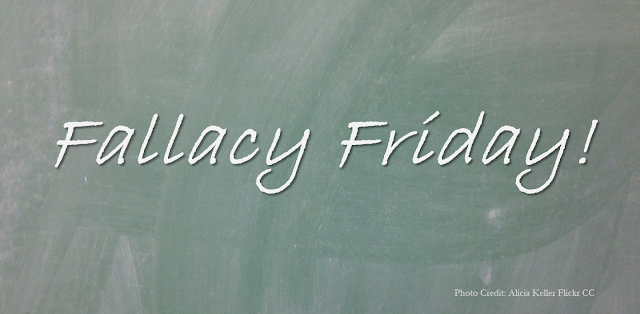 (argument from the club, appeal to the stick, Argumentum ad Baculum, argument to the cudgel)
(argument from the club, appeal to the stick, Argumentum ad Baculum, argument to the cudgel)
A combination of both the appeal to consequences and appeal to emotion, this fallacy occurs when someone uses coercion, intimidation, psychological pressure, force, or threat of force (direct or indirect) as a means of persuasion. It’s fallacious when the threat of force is unrelated to whether or not their position is valid or correct. When the negative consequences are a direct result of the premise, it isn’t fallacious: “If you drive while drunk, you will go to jail.”
(Circular Reasoning, Big Lie Technique, Staying on Message, petition principia – “assuming the initial point”)
A type of circular reasoning, this fallacy occurs when the conclusion you are trying to prove is part of your premise. The initial premise is assumed to be correct without any evidence supporting it and often occurs when assumptions are so ingrained that the one making the claim isn’t even aware that it might not even be true. This term is often misused to mean “raises the question.”
(Argument from Age, Wisdom of the Ancients, Appeal to Antiquity)
This fallacy is the misconception that ancient practices or beliefs are superior to modern ones (related to appeal to authority and appeal to tradition). Those that use this fallacy argue that the length of time that something has been practiced is a sign of its worthiness or truthfulness when more often it is a sign of wishful thinking, ingrained tradition, appeals to authority, and/or the perpetuation of anecdotes. Not every ancient practice is wise or valid (trepanation, flat earthism, geocentricism, human sacrifice, etc.), and just because science has confirmed the efficacy of some ancient practices (like some herbal medicines), that does not validate all ancient practices (like blood-letting). In fact, this fallacy is often used when scientific evidence is lacking, often by those pushing alternative medicines or religious practices.
This fallacy occurs when someone argues that a particular position must be accepted because those affected need "closure," regardless of how morally or ethically questionable the position is. Sometimes the argument takes the form of, “Let’s just agree to disagree so we can move on,” even if one position is wrong. Not only will some issues never be settled, making decisions out of the need to move on may result in an ineffective solution. This is often seen in our legal system when a sentence is delivered, in part, so that those affected by the crime can receive some closure.
Examples:
“Society would be protected, crime would be deterred, and justice would be serviced with we sentenced you to life without parole, but we need to execute you in order to provide some sense of closure for the families.”
“We need to make an arrest to give the family a sense of closure.”
“Let’s just agree to disagree.”

